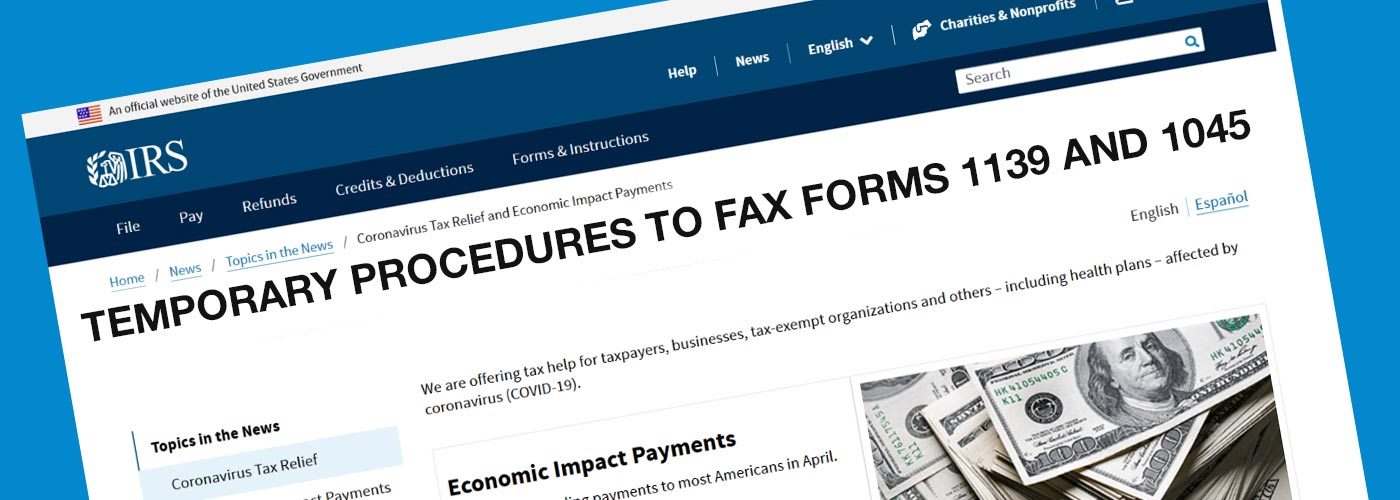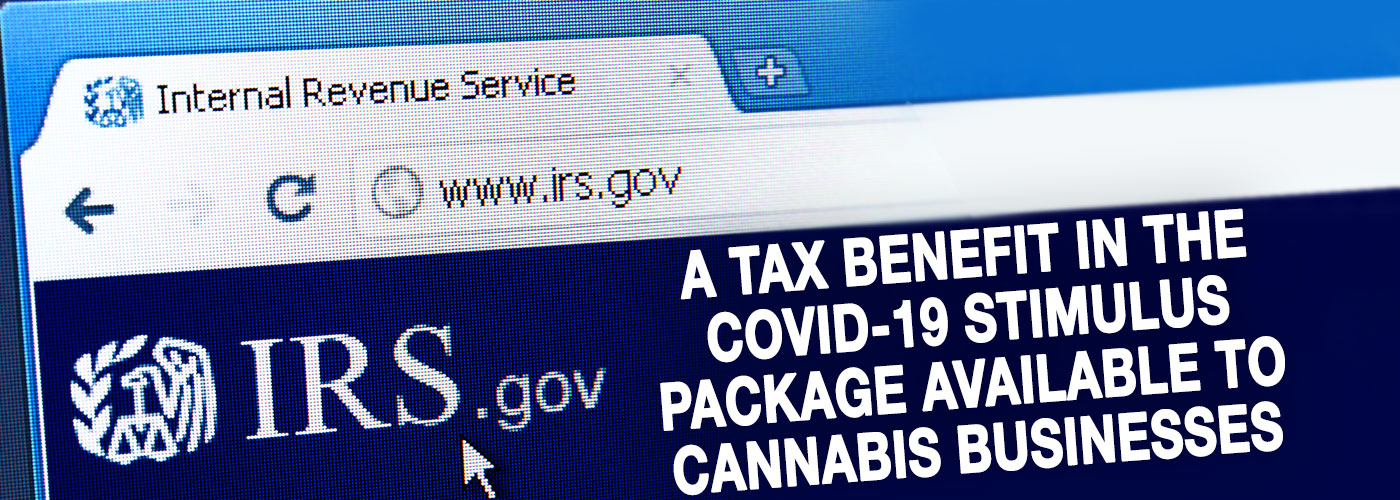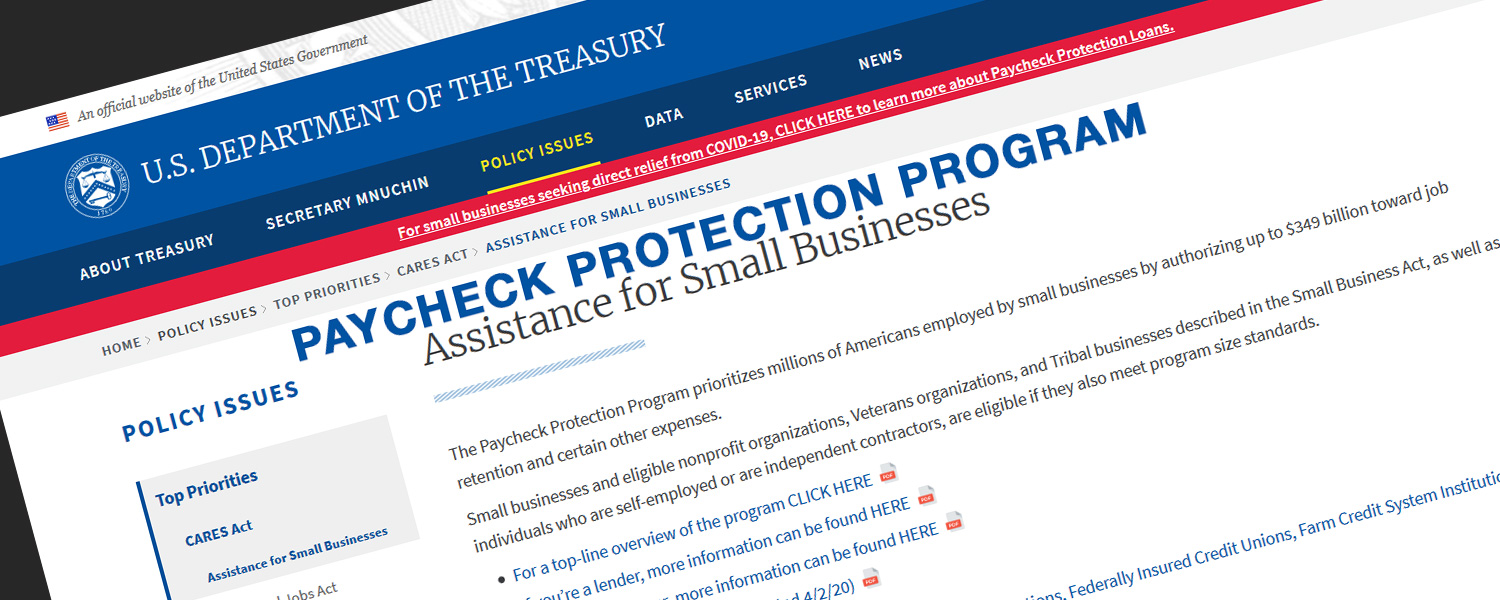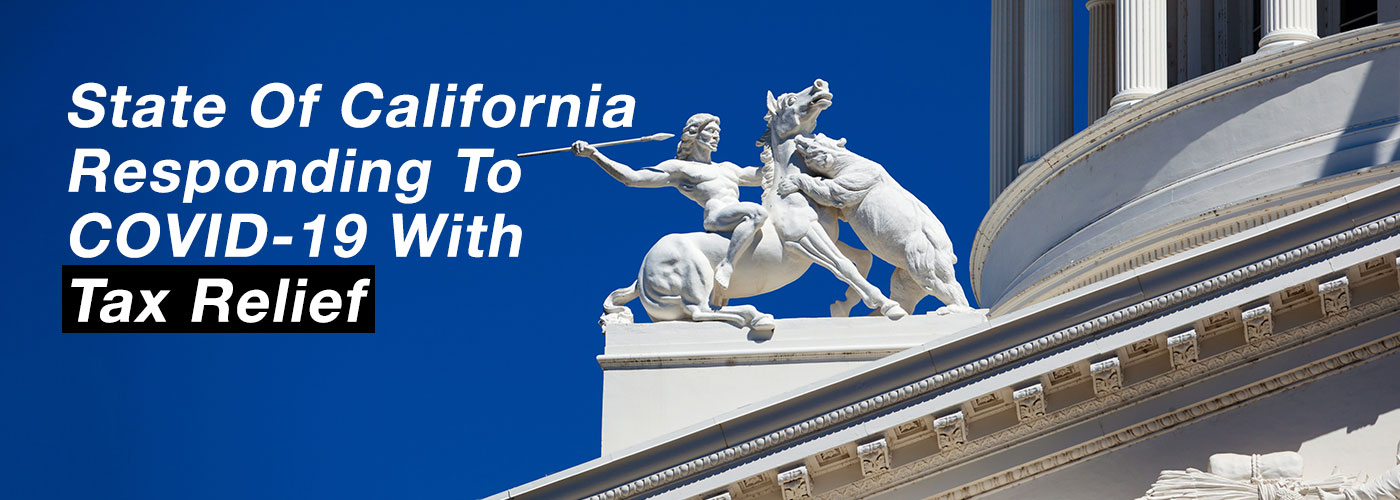IRS Announces Temporary Procedures To Fax Forms 1139 And 1045 Due To COVID-19
IRS Announces Temporary Procedures To Fax Forms 1139 And 1045 Due To COVID-19
President Trump signed the $2 trillion Stimulus Bill formally known as the Coronavirus Aid, Relief and Economic Security [CARES] Act (the “CARES Act”) to provide assistance to workplaces and employees. The CARES Act provides many benefits intended to deliver cash into the hands of individuals and businesses, as well as many other tax provisions.
On April 13, 2020 the IRS issued temporary procedures to fax certain Forms 1139 and 1045 due to COVID-19.
The following provisions have retroactive effect that business may be able to claim refunds of previously paid taxes by filing amended tax returns (using Forms 1139 or 1045) for 2018:
Suspension Of Restrictions On The Use Of Net Operating Losses (Section 2303 of The CARES Act)
Under the 2017 Tax Cuts And Jobs Act (TCJA), net operating losses were no longer eligible to be carried back, and their usage, when carried forward, was limited to 80% of taxable income. Under the CARES Act, net operating losses created in the 2018, 2019 and 2020 tax years can be carried back five years with no limitation on their usage.
Suspension Of Prior Business Loss Limitations (Section 2303 of The CARES Act)
Under the TCJA, taxpayers (other than C corporations) were limited in utilizing net business losses (i.e., business losses in excess of business income). These taxpayers were limited to using only $250,000 ($500,000 on a married joint return) of net business losses against non-business income. The CARES Act suspends this rule so that net business losses for 2018, 2019 and 2020 can be used without limit.
Immediate Refund Of Corporate AMT Credit (Section 2305 of The CARES Act)
The TCJA provided that the alternative minimum tax no longer applied to C corporations. Those corporations with AMT credits were given the ability to recover these amounts as tax reductions and refunds over a four-year period (2018 to 2021.) The CARES Act cuts this refund period in half (2018 to 2019) and corporations can make an election to recover the AMT credit entirely in 2018.
Only claims allowed under sections 2303 and 2305 of the CARES Act that are made on Form 1139 or Form 1045 are eligible refund claims under temporary procedures described below
Temporary Procedures For Digital Transmissions Of Forms 1139 Or 1045
Starting on April 17, 2020 and until further notice, the IRS will accept eligible refund claims Form 1139 submitted via fax to 844-249-6236 and eligible refund claims Form 1045 submitted via fax to 844-249-6237. Before then, these fax numbers will not be operational.
File size limitations: A maximum of 100 pages can be initially faxed to either of the fax numbers listed above. If additional documentation is required to be attached or deemed to be necessary, taxpayers will be notified during the processing of the Form 1139 or Form 1045.
How does the process change from the normal hard copy mailing requirement?
Previously, these forms could be filed only via hard copy delivered through the USPS or by a private delivery service. This temporary procedure to accept these forms via fax permits the IRS to make the relief in the CARES Act available to taxpayers before IRS processing centers are able to reopen. The procedures to process claims will remain the same – the only difference is to allow an additional method to file eligible refund claims.
If I previously mailed in my Form 1139 or Form 1045, can I now fax it to these numbers?
Yes. The IRS states that if you previously mailed a hard copy of either of these forms that is an eligible refund claim (because it contains changes permitted by the AMT and NOL provisions of the CARES Act identified above) after March 27, 2020, you can now submit that same claim to the fax numbers stated above starting on April 17.
Is there an order of priority in processing Form 1139 and Form 1045 under this temporary fax procedure?
The IRS states that all claims (including those received before IRS processing centers were closed) will be processed in the order of receipt.
What happens if a document faxed as instructed above is deemed an ineligible refund claim under this temporary fax procedure?
The IRS states it will be processed after normal operations resume.
Section 2303 of the CARES Act amended section 172(b)(1) to provide for a carryback of any net operating loss (NOL) arising in a taxable year beginning after December 31, 2017, and before January 1, 2021, to each of the five taxable years preceding the taxable year in which the loss arises (carryback period). I am carrying back an NOL to a tax year in which I have a section 965(a) inclusion (section 965 year) and am now entitled to a refund for the section 965 year because my section 965 net tax liability is fully paid. May I use Form 1139 or Form 1045, as applicable, to apply for a refund for the section 965 year?
Yes. The IRS states you may disregard the instructions for Form 1139 and Form 1045 which prohibit taxpayers from using these forms to apply for refunds for section 965 years. The instructions to these forms will be updated to reflect this change. However, please be aware that because the CARES Act added section 172(b)(1)(D)(iv) to provide that a taxpayer who has a carryback to a section 965 year is deemed to have made a section 965(n) election that limits the amount of the loss that can be carried back to each such year, an NOL can be carried back only to reduce income in excess of the amount of the net section 965(a) inclusion. The IRS expects to issue additional instructions on filing requests for tentative refunds for taxpayers with outstanding section 965(h) net tax liabilities, so that these requests and liabilities can be identified, routed, and tracked appropriately, and so that payment schedules can be adjusted to avoid unintentional or erroneous acceleration of deferred section 965(h) installment payments, delays in refunds, or other processing complications.
Will the IRS be establishing a similar procedure for Form 4466 “Corporation Application for Quick Refund of Overpayment of Estimated Tax”?
No. The IRS states that the Form 4466 must be filed in accordance with existing form instructions. If a Form 4466 is faxed to one of the fax numbers noted above, it will not be accepted for processing.
Will this temporary faxing process become permanent?
No. The IRS stated that accepting faxed versions of these forms that are normally delivered through the USPS or by a private delivery service is meant as a short-term measure to assist taxpayers in receiving refunds provided under the CARES Act as quickly as possible.
Click here for COVID-19 Tax Relief measures instituted by the IRS in “The IRS People First Initiative” that can benefit you.
What Should You Do?
You know that at the Law Offices Of Jeffrey B. Kahn, P.C. we are always thinking of ways that our clients can save on taxes and with these tax law changes it is possible that business can claim refunds now by filing an amended return. If you are selected for an audit, stand up to the IRS by getting representation. Tax problems are usually a serious matter and must be handled appropriately so it’s important to that you’ve hired the best lawyer for your particular situation. The tax attorneys at the Law Offices Of Jeffrey B. Kahn, P.C. located in Orange County (Irvine), Northern California (including Sacramento, San Francisco and San Jose) and elsewhere in California are highly skilled in handling tax matters and can effectively represent at all levels with the IRS and State Tax Agencies including criminal tax investigations and attempted prosecutions, undisclosed foreign bank accounts and other foreign assets, and unreported foreign income. Also if you are involved in cannabis, check out what a cannabis tax attorney can do for you. And if you are involved in crypto currency, check out what a bitcoin tax attorney can do for you.











 Follow
Follow Follow
Follow